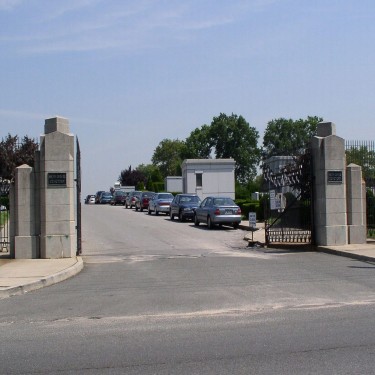New Romance: A Practicum for the Living
by Nadine Friedman

If you’re looking to suss a fling from a partner, a fantastic early date is hitting up a cemetery to visit your dead mother. Because it’s not like they’re meeting at Thanksgiving, and it moves along a subconscious effort to both sabotage a new romantic relationship and forcibly resolve an old family one. That’s my outlook on intimacy, anyway.
It was three months after my mother died of complications from a 20-year struggle with multiple sclerosis. She hadn’t walked, or spoken coherently, in years. It ended badly in May. Come August, I found myself in — among the frayed nerves, fear of death, unresolved grief and anger — a relationship. And somewhere between falling in love and trying to function, I decided “now” was the best time to visit her grave. It was partly to get it over with. We’d done the math: she was dead. Put up the headstone and let’s forget it happened. And because subconsciously I didn’t want to love anyone, ever, I asked my new boyfriend to come, presenting it somewhat like a day trip to an upstate winery. “Lemme show you how unsavory my gene pool is, and, by extension, how truly vile I am as a mate, daughter, and person, and you can bail early before I really start loving you. And then we can get lunch.” Really, this was some weird private performance designed to keep my one-woman show as-is. I didn’t want a boyfriend around, and I didn’t need a mother to remember.
A train and a cab ride later, we arrived at the cemetery office, which looked like a hybrid 1980s bank and Rapid Realty office (in terms of new real estate matters, realty and mortality are similarly cyclical business models). Behind bulletproof glass, a yarmulked man printed me a map of the massive Beth David Cemetery with my mother’s Jewish name on it and the intersection at which she now resided: Unit H6, between Joshua and Benjamin, talk a left at Mechla … something. There was a mile-long walk to where she was buried, and I was with my boyfriend of a month, and I was wearing snakeskin heels, and I kept thinking, “This is such a good decision.” Soundtrack to the situation’s gravity was the Mister Softee truck’s jingle on Elmont Avenue, drifting over in mocking perpetuity.
At first, we couldn’t find her. And then Jared called my name while I leaned on a Rosenfeld, examining the map of H6. My stomach turned. I lumbered over, my heels squishing into the earth. I saw my grandmother and grandfather’s name on a headstone.
Wait. Waaait. I know them. If they were here, then. Um.
Yeah. Next to the headstone, Jared stood above a foot high mound of dirt.
She was here. Why didn’t I think she was here?
My plan to break free of him, break free of her, ended when I saw that dirt. There was a plastic sign at the head of the mound with her name. I planned to be detached, poetic, maybe let a single tear shimmer in the August sun. I planned to make it quick. I also planned to never shit at a guy’s apartment. But, so to speak, I shit in front of him, right there.
When I saw that dirt, I climbed down to her. She moved into my heart, my stomach, my fingers. I grabbed the dirt, I wanted to go so deep down that I might be under there. I held the dirt, I held her. My friend Dan once said when his father was dying, he crawled into the hospital bed and held him with naked love. I thought that was creepy; I never understood that until I was there, in the sun, leaves sticking to my knees. I never saw her, loved her, as much as I did then. I curled into her, breathing in the fine late summer heat and the dust and feeling so, so sorry I didn’t comfort her when I could, when she actually needed me to.
I got up after a while. I sat on my grandmother’s headstone but I didn’t talk to her. I listened to the ice cream truck. Jared sat and smoked over in H5. I could have stayed there all day, in this other life. But H6 isn’t going anywhere, and neither is she. Something is there all day long, all forever long. After the sun goes down, and the ice cream truck pulls away, I imagine that it’s quiet. At least from what we can understand.
I turned back to Jared. He was still there, found her before I tripped on her. I wanted to ask him things — who he was. If he could really tell how terrible I was during her life, if it mattered that he’d never see photos of my mother and I together because I didn’t want to be near her. Remind him I’m not normal, or kind, and beg him to leave me. Ask if he knew we’d both die, maybe not together, and whether he’d care. Instead, I asked what he did when he saw her. He stubbed his cigarette. “I just said ‘Hi.’”
He also admitted later that night that he had been craving curly fries from a diner, but hadn’t thought it was appropriate to say so. Sometimes it’s easy to love someone, for them to fall simply into your heart. You find yourself ready. My mother fell right into mine, ironically late. Jared fell right in. My parents fell at a bar in 1971. We have so little time with them; I suppose it’s more efficient that way.
Writer and photographer Nadine Friedman’s work can be found on Nona Brooklyn, F***Ed in Park Slope, BrokeAss Stuart, and Biographile. She’s currently compiling photographic portraits and biographies of individuals living with MS.